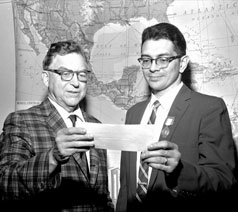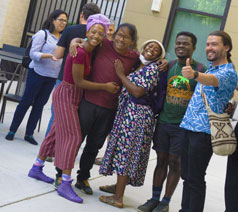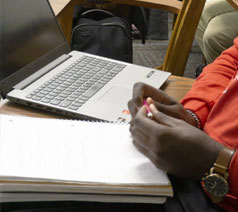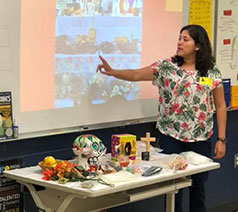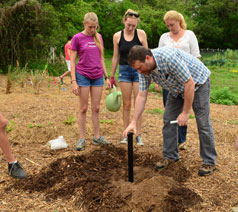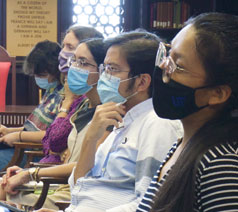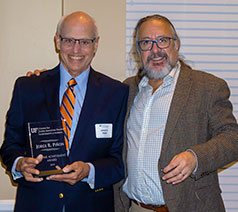Annual Conference | Day 2
Event Start Date: March 25, 2023 10:00 AM
Event End Date: March 25, 2023 1:00 PM
.
71st Annual Conference | Day 2
Saturday, March 25 | 10:00 am - 1:00 pm
Anti-racist Education in Latin America: Perspectives on State and Grassroots Projects
Location: Smathers Library Room 100
These workshops are opportunities for informal conversation between the scholars of the conference and the public on specific topics
Schedule
10:00 - 11:15 am
Experiences of indigenous and Afro-Latin academics in the Latin American academia (workshop will take place in Spanish)
Luis Alberto Tuaza, Zaira Rivera, Edmundo Hernández*, José Antonio Caicedo
11:15 - 11:30 am Break
11:30 am - 12:45 pm
Collaborative workshop on ideas and strategies for decolonizing education in the Americas
Speakers and organizer
*Guest speaker participating virtually
Biographies of speakers
María del Carmen Baerga Santini is Professor in the History Department at the University of Puerto Rico, Río Piedras Campus. She has served as coordinator of the Graduate Program in History and as Assistant Dean of Graduate Studies at the Faculty of Humanities. She began her career as a researcher at the Center for the Study of Puerto Rican Reality (CEREP). She earned her master's and doctoral degrees from the State University of New York at Binghamton. Baerga worked in the Women's Studies Project at the University of Puerto Rico, Cayey and at the Universidad del Sagrado Corazón, where she directed the Center for Academic Research. She has numerous publications on the topics of gender, race and sexuality. She is the author of the book Negociaciones de sangre: Dinámicas racializantes en el Puerto Rico decimonónico, published by Editorial Iberoamericana Vervuert. She is currently completing a book manuscript tentatively titled Ignoble Chronicles: Histories of Sexuality in Puerto Rico.
José Antonio Caicedo Ortiz holds the Afro-colombian Chair at the Universidad del Cauca in Colombia. He is a sociologist and has an MA in Latin American Studies from Universidad Andina in Quito. He has collaborated with the Afro-Latin American Institute at Harvard University. He is the author with Elizabeth Castillo of the book Racismo escolar: debates educativos y crónicas.
Elizabeth Castillo Guzmán is a Professor at the Department of Intercultural Studies and the Ethnoeducation Program of the University of Cauca. Psychologist from the National University of Colombia and Master in Social Psychology from the Pontificia Universidad Javeriana in Bogotá. Coordinator of the Center for Ethnic Memories. Colombian researcher on issues related to the history of Other educations, school racism, pedagogies of recognition, interculturality and educational justice.
Hugo Cerón Anaya, is Associate Professor of Sociology in Lehigh University. He is the author of Privilege at Play: Class, Gender and Golf in Mexico (Oxford UP, 2019). He is currently researching the education of the elites in Guadalajara, Mexico.
Francisca de la Maza es subdirectora del Centro de Estudios Interculturales e Indígenas de Chile. Sus líneas de investigación son las políticas del reconocimiento, las practices estatales y la interculturalidad. Ha publicado libros, artículos y capítulos sobre derechos, política y educación en el territorio Mapuche.
Solsiree del Moral is a historian of modern Latin America and the Caribbean, with a focus on Puerto Rico, the circum-Caribbean, and U.S. Colonialism. In 2013 she published her first book, Negotiating Empire: The Cultural Politics of Schools in Puerto Rico (University of Wisconsin Press). She focused on the ways in which Puerto Rican teachers – a group that changed dramatically from 1900 to 1950 – tried to fulfill teaching philosophies informed by local history and politics, given the constraints of the aggressive Americanization campaign waged by the US colonial government and its American and Puerto Rican representatives on the island. Her second book, “Street Children, Crime and Punishment,” is a history of the criminalization and incarceration of Puerto Rico’s urban street children – a heterogeneous group including the homeless children who worked and slept in the streets as well as the housed poor and working-class children who earned wages in public spaces – in the first half of the twentieth century.
Gunther Dietz grew up in southern Chile and in northern Germany. He holds an M.A. and a Ph.D. in anthropology from Hamburg University. Currently he is a research professor in Intercultural Studies at Universidad Veracruzana (Mexico), where he works on indigenous youth, ethnicity, interculturality and intercultural / inter-religious education. He is co-directing the project “Indigeneity and Pathways through Higher Education in Mexico”, carried out by the University of Bath (UK), UNAM and Universidad Veracruzana and subsidized by the Economic and Social Research Council (ESRC). Author of numerous books and peer reviewed articles, his latest publication (co-authored with Laura Selene Mateos Cortés) is: “Indigenous Youth in Intercultural Universities: New Sites of Knowledge Production and Leadership Training in Mexico and Latin America” (in: The Routledge Handbook of Indigenous Development, p2023).
Edmundo Hernández Amador is a research professor at the Departamento de Investigaciones Históricas del Movimiento Obrero of the Benemérita Universidad Autónoma de Puebla (BUAP), México. He is a Historian and Sociologist. A native speaker of Nahuatl, Dr Amador promotes multilingual, multicultural historical education, research, and impact. A member of the BUAP research group Poder, Clase y Cultura, he is a Virtual Visiting Scholar at the Department of Languages, Cultures, and Film (LCF) of the University of Liverpool, working to develop self-representation, curation and documentation of Mexican indigenous linguistic (MIL) cultures by young MIL speakers. A member of the Instituto Mora research group Seminario Permanente de Historia Contemporánea y del Tiempo Presente en México, Edmundo Hernández Amador is interested in multicultural education in the XXIst century, indigenous intellectuals, and formation of the state in contemporary Mexico. His recent publication with Andrés Sandoval Gil is “Multiculturalism, intercultural university, and civil society in the Sierra of Zongolica, Mexico”. Dialectical Anthropology, Volume 46, issue 2, June 2022. Dr Amador is participating virtually in this conference.
Carmen Martínez Novo is Professor of Latin American Studies and Anthropology at the University of Florida. She is the editor in Chief of the Latin American Research Review, the flagship journal of LASA since 2021. She is the author of Undoing Multiculturalism (Pittsburgh UP, 2021), Who Defines Indigenous (Rutgers 2006) and editor of Repensando los movimientos indígenas (FLACSO 2009). She has written about the history and ethnography of intercultural education in Mexico and Ecuador.
Zaira O. Rivera Casellas, critical essayist and university professor in the Department of Hispanic Studies of the University of Puerto Rico, Río Piedras Campus. She has published articles on literature and racial identity in journals such as Afro-Hispanic Review, Cincinatti Romance Review, Sociocriticism, and Revista Iberoamericana. She has collaborated in the anthologies Escrituras en contrapunto: estudios y debates para una historia crítica de la literatura puertorriqueña (2015) and Contrapunto de género y raza (2005). In 2015, she published her book Bajo la sombra del texto, la crítica y el silencio: el discurso racial en Puerto Rico. She is currently researching and working on a manuscript on racial representations, national imaginaries, identities, and gender from the Afro-diasporic perspective.
Luis Alberto Tuaza has a PhD in Social Science and Political Studies from FLACSO, Ecuador. He is the Vice-Provost for Research and Professor at the Universidad Nacional of Chimborazo. His is the author of six books and numerous articles in peer reviewed journals on the topics of ethnicity, indigenous culture and history, indigenous people and climate change, indigenous politics and higher education. His books are: El cambio climático y las comunidades indígenas en los Andes centrales del Ecuador (2021), Anejos libres e indios sueltos: La Moya y sus alrededores (2018), Kawsaypak yuyaykuna (2018), La construcción de la comunidad desde los imaginarios indígenas (2017), Etnicidad, política y religiosidad en los andes centrales del Ecuador (2012) y La crisis del movimiento indígena ecuatoriano (2011). He is a member of the Kichwa nationality of Ecuador.

